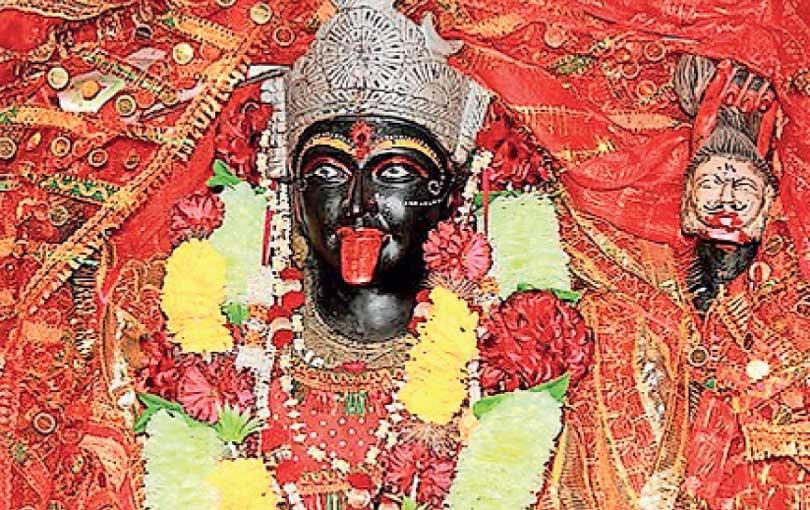Reply To:
Name - Reply Comment
Last Updated : 2024-04-25 14:54:00
 There is the issue of the potion’s association with the Goddess Kali, which, according to Dhammika Bandara, gives it a spiritual potency lacking in Western cures
There is the issue of the potion’s association with the Goddess Kali, which, according to Dhammika Bandara, gives it a spiritual potency lacking in Western cures
 There are three aspects to the controversy over the “anti-COVID-19 potion” named “Dhammika Paniya” after its discoverer and promoter Dhammika Bandara, a Shaman at the Sri Weera Badra Kali Devalaya in Hettimulla, Kegalle.
There are three aspects to the controversy over the “anti-COVID-19 potion” named “Dhammika Paniya” after its discoverer and promoter Dhammika Bandara, a Shaman at the Sri Weera Badra Kali Devalaya in Hettimulla, Kegalle.
Firstly, questions are being raised regarding the scientific basis of the potion as per Western standards of inquiry. Secondly, there are questions over the place of indigenous medicinal concepts and modes of preparing drugs in a globalised medical world which has a bias towards Western concepts. Thirdly, there is the issue of the potion’s association with the Goddess Kali, which, according to Dhammika Bandara, gives it a spiritual potency lacking in Western cures.
The moment Bandara’s potion gained popular attention, the troubled masses queued up to get a quarter bottle of it free; government MPs also imbibed it, giving a hint of State backing. There was condemnation from the powerful Western medical fraternity and its supporters however. The potion was portrayed as a danger to public health, and Bandara as a quack and a charlatan. Given the rising tide of opposition, government ministers assured that scientific tests were being conducted on the potion in Western medicine hospitals and that the potion (principally made with bees’ honey and nutmeg) was approved only as a food supplement to increase general resistance.
But supporters of traditional medicine ask whether it is fair to subject indigenous medical concepts and preparations to Western testing because the two systems rest on different principles. Looking at it from a broader perspective, a Sri Lankan researcher at Griffith University in Queensland, Australia, Dr.Nirekha de Silva, in her paper entitled: Healing and Wellbeing: Practices, Culture and the Role of Government of Sri Lanka (2016) points out that the survival of traditional knowledge in Sri Lanka is threatened by globalization backed by MNCs and their supporters in the media. Traditional theory and practice are routinely debunked and this was clearly evident when Dhammika Bandara came up with his potion. Nirekha de Silva fears that a valuable heritage will disappear without a trace if such indigenous systems are not protected.
Kali cult
Bandara’s invoking the Hindu Goddess Kali to cure COVID-19 has also been mocked and criticized. A Colombo-based Hindu Tamil leader publicly slammed him for misusing the Hindu Goddess by claiming that his potion is imbued with Kali’s spirit. But what is forgotten is that Kali is widely invoked in India and Sri Lanka both by Hindus and Buddhists to fight diseases. And Kali is part of the Sinhala-Buddhist pantheon of deities as much as it is of the Hindu pantheon. Tulasi Srinivas, Professor of Anthropology, Religion and Transnational Studies, Institute for Liberal Arts and Interdisciplinary Studies, Emerson College, Boston, Mass., notes in her paper that during the pandemic-induced lockdown in India, science and faith were not seen as inimical to one another, but as working together, hand-in-glove. Hindu artistes portrayed Kali as a fighter against the coronavirus with the necessary gear like masks and vaccine syringes.
In his paper: The History of the Kāli Cult and its Implications in Modern Sri Lankan Buddhist Culture, in the journal Alternative Spirituality and Religion Review (2018) Wimal Hewamanage of Colombo University shows that Kali has become integral to Sinhala Buddhism as a instrument to solve non-spiritual, secular problems including diseases. Hewamanage says that Kāli is seen as a mother Goddess like Lakṣhmi, Durgā, and Saraswati.
The Kali cult is but part of the Pattini cult, and both came to Sri Lanka from South India, Hewamanage says. When Buddhism and Jainism went into decline in South India between the 8 th., and the 13 th., centuries, Buddhists, who were pushed out of South India, settled on Sri Lanka’s western coast. They brought with them the Pattini cult which had already been absorbed into the Sanskritic cults of Kāli, Durgā or Bhagavati in South India.
But the Sinhalese separated Kali from the rest and saw her as a folk deity and not as a mainstream Goddess. The main reason for this was that the iconography of Kali represented blackness, intolerance, evil, and danger—attributes which did not gel easily with pacifistic Buddhist beliefs, Hewamanage says. But given her growing popularity, Kali is being slowly transformed from a Demon to a Goddess, he adds. Sinhalese believe that there are seven forms of Kāli: i) Bhadra Kāli; ii) Mahā Bhadra Kāli; iii) Pēna Kāli; iv) Vanduru Kāli (Hanumā Patra Kāli); v) Rīri Kāli; vi) Sohon Kāli; and vii) Gini Kāli.
The Munneśwaram temple complex located in the Puttalam district is one of the main centers of Kali worship. It attracts Sinhalese Buddhists and Hindus alike. The complex has shrines for Śiva, Gaṇeśa, Ayyanāyaka, Kāli, and the Buddha. While the Śiva temple is the most prestigious, both among Hindus and Buddhists, the Kāli temple is also very popular mostly attracting the hoi polloi.
Anthropologist Gananath Obeyesekere refers to a Sinhalese Buddhist myth, according to which, when Kāli came from South India and landed at Chilaw near Munnēśvaram, she started devouring human beings. But Pattini, already an established Sinhalese deity by then, prevented her from killing. Soon, Kāli became Pattini’s maid servant. Obeysekere says that Kali’s duties, as outlined in the ritual called “Killing and Resurrection” (Marāipæddīma), are exactly the same as those of any servant in a Sinhala household.
The Mōdara temple, one of the most famous Kāli temples in Sri Lanka, has an image of Kāli with sixteen arms, and she is named Sohon-kāli. Hewamanage notes that although the names of the other Gods’ shrines (like those of Viṣṇu and Īśvara, for instance) are written in Tamil, Sohon-kāli’s name is written in Sinhala. The shrine is very popular among troubled souls. Those with health, familial and business problems make a beeline for it.
Like the Hindus, Buddhists and also Muslims, use Mantras and Yantras in Kali worship. The Mantra is an incantation and a Yantra is a design which is used as an instrument to aid worship. This “instrument” helps utilize resources lying in the depths of the worshiper’s subconscious.
The mantras intoned during worship with Yantras are in Sanskrit, Tamil, and Sinhalese. Hewamanage points out that since Muslims also flock to the Kali temple to solve their secular problems, one of the Mantras is partly in Arabic, demonstrating the syncretic nature of Sri Lanka’s culture.
The partly Arabic Mantra goes like this: “Bisibillārahimānarahim, ākunp ayark undi dālām ata hārī mukkumukaa libādan kubādan mohanmat lāilāi llallā mohemmad sulallāhi.” This is to be repeated 108 times like many Mantras. However, according to Hewamanage, non-Muslim devotees are given the option of dropping the Islamic part of the Mantra if they want to.
Helucinated Tuesday, 29 December 2020 07:26 AM
I had great respect for this writer, but now this????? Anyway the more the merrier!

Add comment
Comments will be edited (grammar, spelling and slang) and authorized at the discretion of Daily Mirror online. The website also has the right not to publish selected comments.
Reply To:
Name - Reply Comment
US authorities are currently reviewing the manifest of every cargo aboard MV
On March 26, a couple arriving from Thailand was arrested with 88 live animal
According to villagers from Naula-Moragolla out of 105 families 80 can afford
Is the situation in Sri Lanka so grim that locals harbour hope that they coul